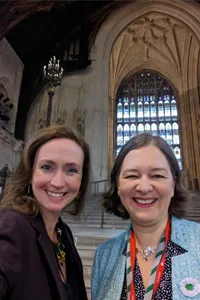19 May 2022
Royal Society Pairing Scheme – A Week in Westminster
by Dr Eileen Gentleman
Earlier this year, Dr Eileen Gentleman, Academic Lead for Impact, participated in the Royal Society Pairing Scheme Week in Westminster. In this short blog, she discusses her experience into the inner workings of Parliament and how science policy is shaped.

Have you ever wondered what it is like to work in Parliament? Earlier this year, I found out as part of the Royal Society Pairing Scheme ‘Week in Westminster’.
Each year, 30 scientists are invited to attend talks and Q&As, and to shadow an MP, peer or civil servant. The scheme is designed to give scientists first-hand experience into the inner workings of Parliament and how science policy is shaped.
There two aspects to policy making: 1. ‘Science for Policy’ – How the work of scientists influences the decisions made by government, and 2. ‘Policy for Science’ – How government policy on funding and universities creates an environment in which quality science can flourish.
In universities, we often talk about ‘Impact’, but policy and impact are inextricably linked. Our scientific discoveries impact government policy, and government policy drives our ability to deliver impact. As newly appointed Academic Lead for Impact within FoDOCS, this was a tremendous opportunity to see this first-hand.
Scientists can influence government policy
One of the central ways in which scientists can influence policy, and thus impact society and economy, is by providing evidence to Parliamentary Select Committees. Parliament often wants advice on a topic, and one means for them to get this is to launch an Inquiry in a Select Committee. Select Committees then invite written evidence from experts in the area. Any individual or group of scientists can provide written evidence, usually in the form of a statement of no more than 3000 words. From the submitted written evidence, the committee invites individuals to provide oral evidence in Westminster.
Why should we as scientists provide evidence to Select Committees? Besides the opportunity to have our science and opinions acted upon, evidence presented to Select Committees is often quoted directly in policy decisions. And, when government acts, we have the basis for a strong Impact Case Study that can be submitted to the Research Excellence Framework. For basic scientists, this is a great opportunity to build an Impact Case Study, simply based on your expertise.
The Science and Technology Select Committee is currently holding inquiries into areas in which our faculty has expertise, including ‘Diversity and Inclusion in STEM’ and ‘Reproducibility and Research Integrity’, but new inquiries are being opened all the time.
You can see all current inquiries here or follow the Science and Technology Select Committee on Twitter @CommonsSTC. If you decide to provide written evidence to a Select Committee, let me know so we follow up on how they act on your evidence.

Learning from leaders in other fields
I was paired for the week with Fleur Anderson, who is the Labour MP for Putney in southwest London. It was eye-opening to get such an intimate look into Fleur’s every day. She has a genuine desire to make things better for her constituents, who she talks about as if they are part of her team.
In talking with her, I realised that like for scientists, success for many politicians comes not from showmanship, but rather years of perseverance and hard work. I asked her what characteristics have made her successful in her field and she spoke about creating a culture of kindness in leadership. She also told me about the importance of lifting others up when you’re a leader. She felt that leaders should share their success and use it to provide others with opportunities, advice which I found particularly relevant for scientists.
Career and internship opportunities
When we talk about future opportunities for PhD students, we usually think about a choice between academia and industry. However, scientists with PhDs are also in high demand in the civil service. The civil service offers long-term job stability and an intellectually demanding environment that constantly presents new challenges.
The civil service and Parliament offer numerous opportunities for internships, including paid opportunities for PhD students. For scientists with permanent academic posts, there are also opportunities to conduct longer-term fellowships in Parliament.
Apply for the Royal Society Pairing Scheme
The application is a simple 1-pager, with the call opening in the autumn. This year, the programme had scientists that were at all stages of their academic careers, including fellows without permanent academic posts. Check the Royal Society website later this year for rules on eligibility.

